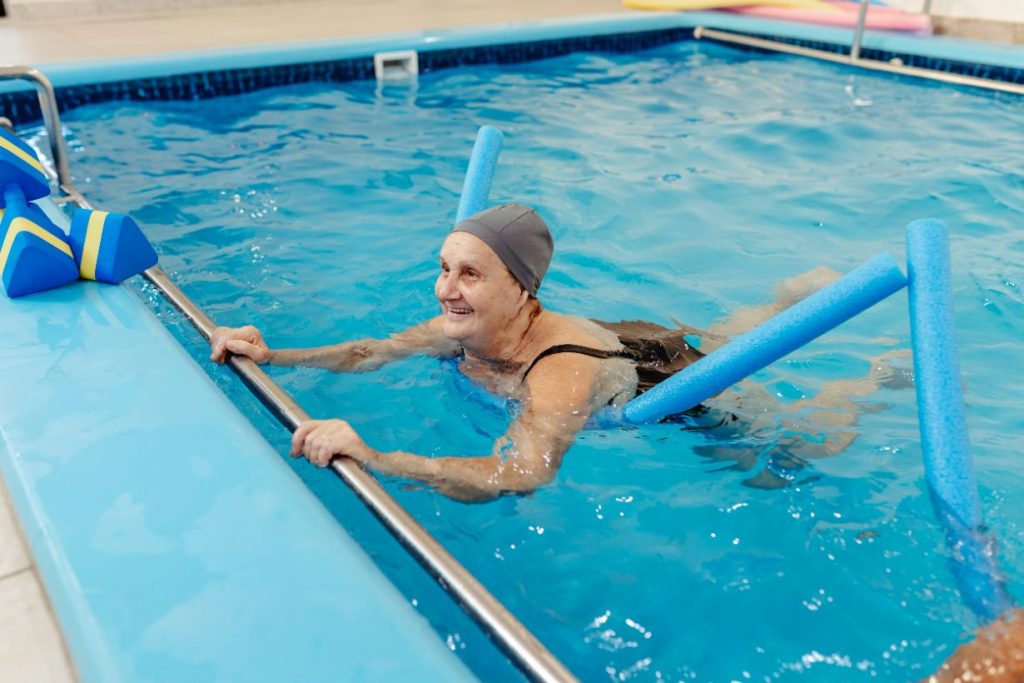
Does Physiotherapy Help Multiple Sclerosis?
Physiotherapy offers a beacon of hope for those navigating the unpredictable waters of Multiple Sclerosis (MS). This chronic neurological condition, known for its diverse symptoms and impact on daily life, challenges millions worldwide. While a cure remains elusive, physiotherapy is a powerful tool in MS management. Targeting physical symptoms and enhancing overall function is crucial in helping individuals with MS maintain their independence and quality of life. Let’s explore how this therapeutic approach can make a significant difference in the lives of those affected by MS.
Understanding Multiple Sclerosis
What is MS?
Multiple Sclerosis (MS) is a chronic, potentially disabling disease that affects the central nervous system, including the brain and spinal cord. In MS, the immune system attacks the protective covering of nerve fibres called myelin, disrupting communication between the brain and the rest of the body. This damage can lead to various symptoms and varying degrees of disability.
Types of MS
MS is characterised by areas of scar tissue (sclerosis or lesions) that result from damage to myelin. There are four main types of MS:
- Relapsing-remitting MS (RRMS): This is the most common form, characterised by periods of new symptoms (relapses) followed by periods of recovery (remission).
- Secondary-progressive MS (SPMS):SPMS often develops in people with RRMS and is characterised by a gradual worsening of symptoms over time.
- Primary-progressive MS (PPMS): Though less common, this is characterised by steadily worsening symptoms from the onset without distinct relapses.
- Progressive-relapsing MS: The rarest form, involving steady symptom worsening from the beginning with occasional acute relapses.
Common Symptoms and Their Impact on Daily Life
MS symptoms can vary widely between individuals and may include:
- Fatigue
- Vision problems (blurred or double vision)
- Numbness and tingling
- Muscle weakness or spasms
- Balance and coordination issues
- Cognitive changes (memory, concentration)
- Bladder and bowel dysfunction
- Pain
- Depression and mood changes
These symptoms can significantly impact daily life, affecting mobility, work capacity, and overall quality of life. Many symptoms are invisible to others, which can add to the challenges faced by people with MS.
The Progressive Nature of MS
Multiple sclerosis (MS) is generally progressive, meaning symptoms worsen over time, but its course is unpredictable and varies greatly among individuals:
-
-
- Some may experience mild symptoms with little disability.
- Others may face steadily worsening disease and increased disability.
- Most experience new symptoms followed by periods of stability with partial or full recovery.
-

Importance of Physiotherapy for MS Management
Physiotherapy plays a crucial role in the disease management of Multiple Sclerosis for several reasons:
- Symptom management: Physiotherapy helps address various MS symptoms, including mobility issues, balance problems, muscle weakness, spasticity, and fatigue.
- Functional improvement: Through targeted exercises and interventions, physiotherapy can help improve and maintain physical function, allowing patients to perform daily activities more effectively.
- Quality of life enhancement: By addressing physical impairments and promoting independence, physiotherapy improves the quality of life for MS patients.
- Disease modification: Recent evidence suggests that exercise, a key component of physiotherapy, may have neuroprotective effects and potentially slow disease progression.
- Individualised care: Physiotherapists can develop personalised treatment plans tailored to each patient’s specific needs and stage of MS.
- Multidisciplinary approach: Physiotherapy is essential to the comprehensive, interdisciplinary care required for optimal MS management.
- Education and self-management: Physiotherapists provide valuable education on exercise, energy conservation, and self-management techniques, empowering patients to take an active role in their care.
With the importance of physiotherapy established, it’s essential to understand its specific roles and goals in MS care.

The Role of Physiotherapy in MS Management
Goals of physiotherapy for MS patients
Physiotherapy aims to improve the overall quality of life for individuals with Multiple Sclerosis through targeted interventions. The primary goals include:
- Maintaining and improving physical and cognitive function
- Enhancing muscle strength and endurance
- Increasing flexibility and range of motion
- Improving balance and coordination
- Managing MS symptoms
- Reducing fatigue through energy conservation techniques
- Alleviating pain through manual therapy and exercise
- Minimising spasticity and muscle stiffness
- Promoting independence in all daily living activities
- Improving mobility and gait
- Enhancing the ability to perform self-care tasks
- Adapting to changing physical capabilities
- Preventing complications
- Reducing the risk of falls
- Preventing muscle atrophy and joint contractures
- Maintaining cardiovascular health
- Educating patients and caregivers
- Teaching proper posture and body mechanics
- Providing strategies for symptom management
- Offering guidance on appropriate assistive devices
When to Consider Physiotherapy for MS
Individuals with MS should consider physiotherapy:
- Immediately after diagnosis
- To establish baseline function and create a proactive management plan
- To learn early intervention strategies for symptom management
- During disease exacerbations or relapses
- To address acute symptoms and functional decline
- To modify treatment plans based on changing needs
- When experiencing new or worsening symptoms
- Increased fatigue or weakness
- Changes in balance or coordination
- New or intensified pain
- Before symptoms significantly impact everyday activities
- To maintain current function and prevent decline
- To learn preventive strategies and exercises
- When considering new assistive devices
- To assess the need for mobility aids
- To learn the proper use of prescribed devices
- During periods of disease stability
- To optimise physical function and fitness
- To prevent deconditioning and maintain gains
- When planning life changes
- Adapting to a new work environment
- Preparing for pregnancy or parenthood
- Modifying home environment for accessibility
- As part of a comprehensive MS management plan
- To complement medical treatments and other therapies
- To address specific functional goals identified by the healthcare team
Benefits for Multiple Sclerosis Patients
Physiotherapy offers numerous benefits for patients with Multiple Sclerosis (MS), addressing various aspects of their physical function and quality of life. Here’s a summary of the key benefits:
- Improving Mobility and Gait:
- Gait training and treadmill exercises enhance walking patterns.
- Functional training improves daily activities like walking and standing.
- Enhancing Balance and Reducing Fall Risk:
- Balance and proprioceptive training improve stability and reduce fall risk.
- Managing Fatigue:
- Aerobic exercises combat fatigue.
- Energy conservation techniques and cooling strategies are taught.
- Addressing Spasticity and Flexibility:
- Stretching and range of motion exercises manage spasticity.
- Strengthening Muscles and Coordination:
- Resistance training maintains muscle mass and improves coordination.
- Respiratory Function:
- Breathing exercises and muscle training improve respiratory health.
- Pain Management:
- Exercises, stretching, and hydrotherapy alleviate pain.

Physiotherapy Interventions for MS
1. Individualised Exercise Programs
Physiotherapists develop personalised exercise programs tailored to each MS patient’s specific needs, symptoms, and stage of the disease. These programs aim to address individual functional deficits and may include a combination of various exercise types.
2. Balance and Coordination Training
- Static and dynamic balance training
- Proprioceptive loading exercises
- Core strengthening
- Rhythmic stabilisation techniques
3. Gait Training and Assistive Device Recommendations
- Gait training exercises
- Treadmill training, including body-weight supported treadmill training (BWSTT)
- Functional training for everyday tasks like walking, sitting, and standing
- Recommendations and training for appropriate assistive devices
4. Stretching and Range of Motion Exercises
- Passive sustained stretches
- Joint compressions
- Range of motion activities to prevent contractures
5. Aerobic and Endurance Training
- Low to moderate-intensity aerobic exercises
- Gradual progression of duration and intensity
- Monitoring to prevent overheating
6. Strength Training
Resistance training is important for maintaining muscle strength and function:
- Moderate-intensity resistance exercises
- Focus on lower limb strengthening
- Progressive overload principle
7. Aquatic Therapy / Hydrotherapy
Water-based exercises offer unique benefits for MS patients:
- Allows for movement that may not be possible on land
- It helps manage heat sensitivity
- Provides resistance for strength training
- Supports balance and coordination exercises
8. Manual Therapy Techniques
- Massage
- Joint mobilisation
- Soft tissue manipulation
- Manual stretching
Additional interventions may include:
- Fatigue management strategies
- Energy conservation techniques
- Activity pacing
- Respiratory function exercises
- Pain management techniques (e.g., ultrasound, postural training)
While these interventions form the foundation of MS physiotherapy, the key to success lies in tailoring these approaches to each individual’s needs.

Customising Physiotherapy for MS Patients
Effective physiotherapy for Multiple Sclerosis requires a tailored approach for each patient’s unique needs and symptoms.
- Individualised Treatment Plans:
- Recognise MS affects each person differently.
- Regularly assess and adjust treatment plans based on symptoms and goals.
- Consider patient preferences and integrate other MS management aspects.
- Adapting Exercises:
- RRMS focuses on maintaining function and managing symptoms during remission.
- PPMS preserves mobility and independence.
- SPMS balances symptom management with functional maintenance.
- Adjust intensity and duration based on severity.
- Managing Fatigue:
- Assess fatigue patterns and triggers.
- Implement energy conservation techniques and pacing strategies.
- Schedule sessions at optimal times and include rest periods.
Managing Progressive Multiple Sclerosis with Physiotherapy
Physiotherapy plays a vital role in managing progressive multiple sclerosis (MS) by addressing the unique needs of patients at various stages of the disease.
- Early-stage MS:
- Education and preventive strategies
- Customised exercise programs for strength, flexibility, and balance
- Cognitive assessment and symptom management
- Moderate-stage MS:
- Strength training, endurance exercises, and balance work
- Assistive device training and environmental modifications
- Fatigue management and collaboration with healthcare professionals
- Advanced-stage MS:
- Maximising independence with postural and ADL training
- Safety strategies and equipment recommendations
- Pain management and caregiver education
Research and Evidence
Based on the available research and evidence, physiotherapy has demonstrated significant benefits for individuals with Multiple Sclerosis (MS). Here’s an overview of the key findings supporting physiotherapy for MS:
- Improved Mobility and Strength: A 2016 study published in the Multiple Sclerosis Journal found that regular physiotherapy significantly improved walking speed and muscle strength in MS patients.
- Reduced Fatigue: Research in Neurorehabilitation and Neural Repair (2018) showed that aerobic exercise as part of physiotherapy reduced fatigue levels by 20% in MS patients.
- Enhanced Quality of Life: A 2019 meta-analysis in Physical Therapy confirmed that tailored physiotherapy interventions improved overall quality of life and daily functioning.
- Experts like Dr Susan Bennett, a leading MS researcher, have emphasised the importance of personalised physiotherapy programs.
Physiotherapy is vital in managing Multiple Sclerosis, offering significant benefits for symptom control, functional improvement, and quality of life. While not a cure, physiotherapy provides valuable tools for navigating MS challenges and supporting patients in leading fuller, more active lives.
Frequently Asked Questions
- How does physiotherapy help with MS?
- Is physiotherapy suitable for all stages of MS?
- What types of exercises are involved in physiotherapy for MS?
- How often should MS patients attend physiotherapy sessions?
- Can physiotherapy reduce the progression of MS?
- Are there specific physiotherapists who specialise in MS?
- How can I start physiotherapy for MS?
Physiotherapy helps manage MS symptoms, improve mobility, enhance balance, reduce fatigue, and increase muscle strength, leading to better daily functioning and quality of life.
Yes, physiotherapy interventions can be tailored to suit early, moderate, and advanced stages of MS, ensuring appropriate care throughout the disease’s progression.
Exercises may include strength training, aerobic exercises, balance and coordination training, stretching, and hydrotherapy.
The frequency of sessions depends on individual needs and disease severity. A physiotherapist will provide a personalised plan.
While physiotherapy cannot stop the progression of MS, it can significantly improve symptoms, maintain function, and enhance overall quality of life.
Yes, some physiotherapists have specialised training and experience in treating MS and can provide tailored interventions.
Contact N-Able Therapies to develop a personalised physiotherapy treatment plan tailored to your needs.